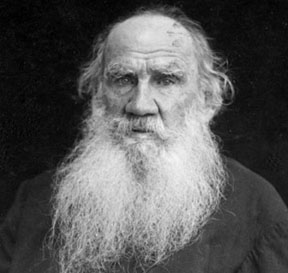
For all humanity to be able to live, and continue to live attributing a meaning to life, they, those milliards, must have a different, a real, knowledge of faith. Indeed, it was not the fact that we, with Solomon and Schopenhauer, did not kill ourselves that convinced me of the existence of faith, but the fact that those milliards of people have lived and are living, and have borne Solomon and us on the current of their lives.
And I began to draw near to the believers among the poor, simple, unlettered folk: pilgrims, monks, sectarians, and peasants. The faith of these common people was the same Christian faith as was professed by the pseudo-believers of our circle. Among them, too, I found a great deal of superstition mixed with the Christian truths; but the difference was that the superstitions of the believers of our circle were quite unnecessary to them and were not in conformity with their lives, being merely a kind of epicurean diversion; but the superstitions of the believers among the laboring masses conformed so with their lives that it was impossible to imagine them to oneself without those superstitions, which were a necessary condition of their life.
The whole life of believers in our circle was a contradiction of their faith, but the whole life of the working-folk believers was a confirmation of the meaning of life which their faith gave them. And I began to look well into the life and faith of these people, and the more I considered it the more I became convinced that they have a real faith which is a necessity to them and alone gives their life a meaning and makes it possible for them to live. In contrast with what I had seen in our circle, where the whole of life is passed in idleness, amusement, and dissatisfaction, I saw that the whole life of these people was passed in heavy labor, and that they were content with life.
In contradistinction to the way in which people of our circle oppose fate and complain of it on account of deprivations and sufferings, these people accepted illness and sorrow without any perplexity or opposition, and with a quiet and firm conviction that all is good.
In contradistinction to us, who the wiser we are the less we understand the meaning of life, and see some evil irony in the fact that we suffer and die, these folk live and suffer, and they approach death and suffering with tranquility and in most cases gladly.
I looked more widely around me. I considered the life of the enormous mass of the people in the past and the present. And of such people, understanding the meaning of life and able to live and to die, I saw not two or three, or tens, but hundreds, thousands, and millions. and they all – endlessly different in their manners, minds, education, and position, as they were – all alike, in complete contrast to my ignorance, knew the meaning of life and death, labored quietly, endured deprivations and sufferings, and lived and died seeing therein not vanity but good.
And I learnt to love these people.
Excerpted from Leo Tolstoy’s 1882 work, ‘My Confession’
Leo Tolstoy






